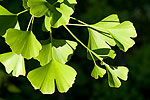 Many health secrets have been uncorked around the subject of ginkgo biloba. It is one of the most storied herbal remedies in existence, rising from ancient Chinese medicine. It is taken by tens of millions of people around the world in the hopes that it will heal their minds. Ginkgo is used to prevent and treat such memory-ravaging diseases as Alzheimer’s disease and dementia.
Many health secrets have been uncorked around the subject of ginkgo biloba. It is one of the most storied herbal remedies in existence, rising from ancient Chinese medicine. It is taken by tens of millions of people around the world in the hopes that it will heal their minds. Ginkgo is used to prevent and treat such memory-ravaging diseases as Alzheimer’s disease and dementia.
Nearly 200 clinical studies have been performed on this herb. In them, we have discovered that this herbal cure may be effective for this handful of conditions:
1. Alzheimer’s & Memory Loss: After 40 studies, a true breakthrough came in a 1997 study that looked at 309 patients with dementia (mostly Alzheimer’s disease). For 52 weeks, they took ginkgo; after, they found the herb led to significant improvements in a whole whack of memory and cognitive tests.
Since then, other studies have shown that ginkgo could relieve symptoms of mild-to-moderate Alzheimer’s. One found that, in 48 healthy old patients, six weeks of ginkgo treatment led to significant improvements in memory. While the evidence is inconsistent, you can safely try ginkgo for this purpose. If your memory improves and you don’t ever get dementia, could it be the work of this ancient herb?
2. Tinnitus: Experts believe that ginkgo is at least mildly effective in treating tinnitus (ringing of the ears). Half the patients involved in a study of 103 experienced improvement or disappearance of symptoms within 70 days using ginkgo. Many other small studies suggest that it works. Some don’t, however, so this is still a controversial area.
3. Sudden Hearing Loss: Ginkgo is considered a herbal treatment for sudden hearing loss, because it helps fix the cause: poor circulation. In 2001, researchers gave 106 patients ginkgo at either 120 mg two times a day or 12 mg two times a day. All of them had a specific form of sudden hearing loss. It didn’t matter which dose the patients took, most of them recovered from the sudden hearing loss two months later. Another study found that ginkgo worked as well as a leading drug.
4. Intermittent Claudication: “Peripheral vascular disease” causes this condition, marked by bad cramping pain in the legs when you walk only a short distance. About 10 studies have found that ginkgo could allow you to walk much longer without pain. Some used 120 mg and had good success, while 240 mg a day has led to even greater success. Overall, the herb seems to improve walking distance and lower pain.
5. Vision-related Conditions: The biggest cause of vision loss in older adults is macular degeneration. It could be improved, when caught early, with ginkgo. Over six months, 20 people with this condition sharpened their vision noticeably using 160 mg of ginkgo a day. Another 24-week study showed that 240 mg a day improved vision in those with macular degeneration. Preliminary evidence showed that 120 mg a day for two months could greatly improve glaucoma as well.
6. Anxiety/Depression: It’s thought to work by boosting circulation of blood to the brain. The major study backing this herb was on 40 patients, aged 51 to 78, who received either 240 mg of ginkgo or placebo for two months. There were significant improvements in the ginkgo patients’ depression as well as an improvement in overall mental state. As for anxiety, a study of 107 people found that either 240 mg or 480 mg of ginkgo a day could help anxiety symptoms, significantly more than placebo.
